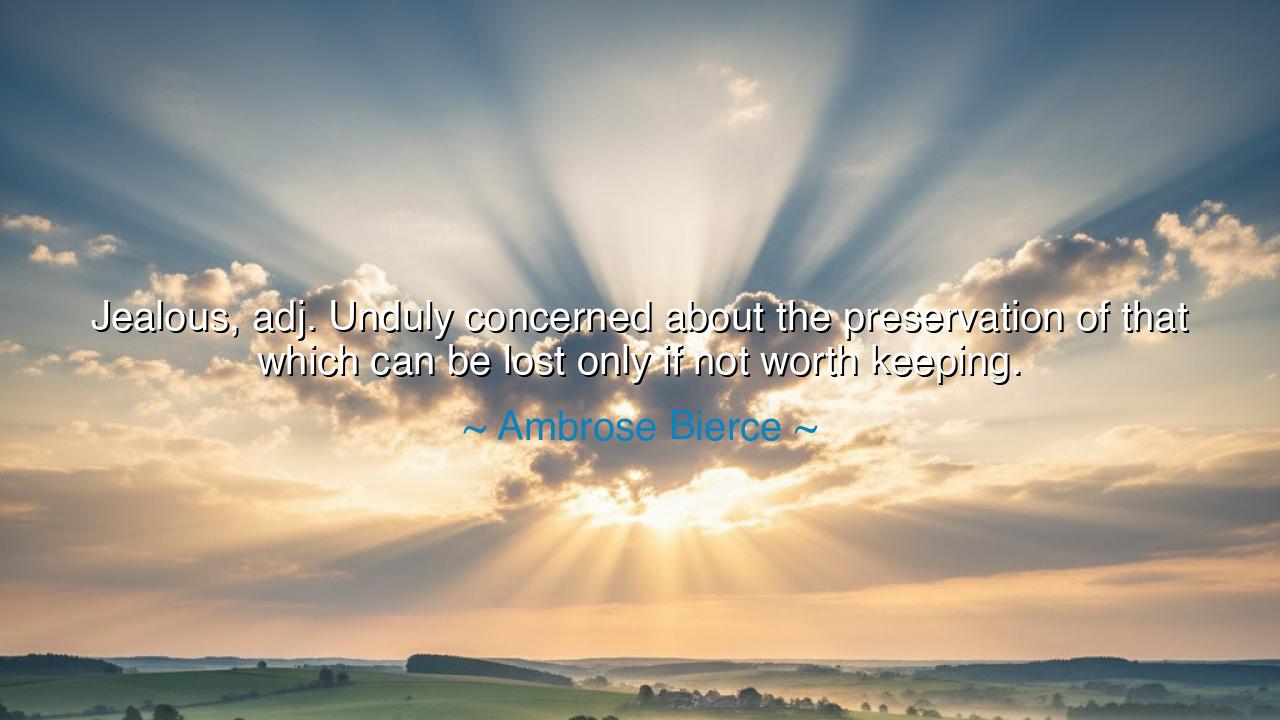
Jealous, adj. Unduly concerned about the preservation of that
Jealous, adj. Unduly concerned about the preservation of that which can be lost only if not worth keeping.






“Jealous, adj. Unduly concerned about the preservation of that which can be lost only if not worth keeping.” Thus wrote Ambrose Bierce, the darkly brilliant American satirist and philosopher, whose pen cut through the illusions of the human heart as a sword through smoke. In this sharp and ironic definition from The Devil’s Dictionary, Bierce exposes jealousy not as proof of love, but as evidence of fear — the fear of losing what, in truth, may not be worth possessing. He declares that what is truly ours — be it love, friendship, or trust — cannot be taken by force or stolen by another. Only what is weak, shallow, or false can be lost, and the heart that obsesses over keeping it shows that it never truly possessed it in the first place.
Bierce lived in an age of moral struggle and human folly, and he observed with keen eyes the frailties that hide behind virtue. His definition of jealousy pierces one of the most universal delusions of humankind — that possession equals value, and that love is secured through control. To be “unduly concerned,” as he writes, is to cling desperately to something that is already slipping away. For the truly worthy things in life — loyalty, integrity, mutual affection — do not require chains. They remain because they are bound by spirit, not by fear. Bierce, who saw in human nature a tragic mix of brilliance and vanity, knew that jealousy is not born of love, but of insecurity, and that it destroys the very bond it seeks to protect.
The wisdom of this thought echoes the teachings of the ancients. Lao Tzu, the sage of the Tao, once wrote: “He who grasps loses.” This truth is the twin of Bierce’s insight. When we grasp at people, achievements, or possessions, we confess that we do not trust them — or ourselves. Jealousy is the grasp of the fearful soul; it is the refusal to accept that love must be free to live, and that loyalty cannot be commanded. The ancients called it a poison of the heart, for it blinds reason, burns affection, and corrodes joy. And indeed, Bierce, with his modern wit and timeless wisdom, merely reminds us of this eternal law: that what is possessed through fear is already lost.
History, too, bears witness to this truth. Consider the tragic tale of Othello, the Moor of Venice, immortalized by Shakespeare’s hand. Othello loved Desdemona with the fervor of the sun, yet he allowed jealousy to darken his heart. He became “unduly concerned” — tormented by the illusion that his love could be stolen. But his obsession revealed not Desdemona’s faithlessness, but his own doubt. He destroyed her, not because she betrayed him, but because he could not trust that what he held was worth keeping. Thus, Othello became the embodiment of Bierce’s definition — a man consumed by the need to preserve what was already safe, until in his madness, he made it truly lost.
Bierce, ever the ironist, shows that jealousy is not noble, but foolish — not an act of love, but an admission of weakness. It is a mirror that reveals our own insecurity more than another’s unfaithfulness. When we become “unduly concerned” about preserving what we love, we cease to love it freely; we turn affection into possession and trust into suspicion. The very act of clinging proves that we do not believe the thing we cling to can endure. In this way, jealousy destroys not only relationships, but the peace of the soul. It transforms beauty into anxiety, and faith into fear.
Yet within Bierce’s cynicism lies an unexpected invitation to wisdom. If we can lose something only because it is “not worth keeping,” then let us seek to love only what endures — truth, virtue, freedom, and sincere hearts. These things do not vanish when others covet them, nor do they weaken under scrutiny. They are not shaken by time or by envy. Therefore, the wise person learns to release the fragile things — the illusions of control, the vanity of possession, the false comfort of jealousy — and to trust instead in what is genuine and strong.
So, my listener, take this teaching as a mirror for your own heart. When jealousy stirs within you, ask not, “What might I lose?” but, “What is worth keeping?” Reflect deeply on whether what you fear losing is love or merely the shadow of love, security or merely the illusion of it. Do not guard what must be free; do not cage what must soar. For true affection is not held by chains but by choice, and what is real cannot be stolen — it can only be shared.
And thus, remember Ambrose Bierce’s eternal irony: the jealous guard what is already dying, while the wise cherish what cannot die. To love without jealousy is to live in freedom; to trust without fear is to dwell in peace. Let go of your grasping, then, and you will find that what remains in your open hand is the only thing that was ever truly yours.






AAdministratorAdministrator
Welcome, honored guests. Please leave a comment, we will respond soon